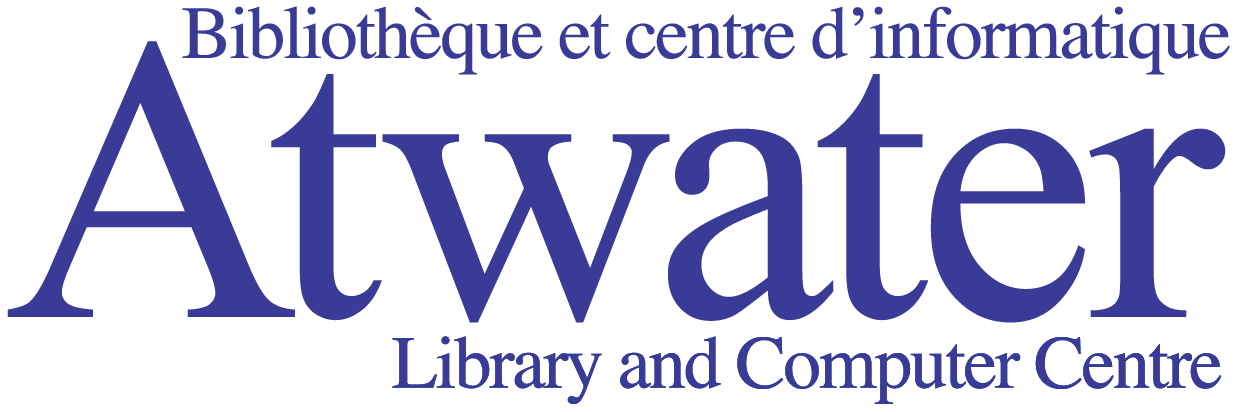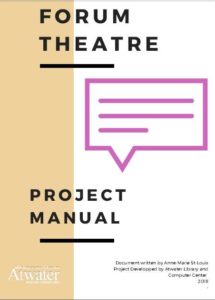Living Tool-Kit for strategies addressing rape culture on campus
This living tool-kit includes strategies that we have piloted with our partners and pilot sites as well as strategies that have been developed by our close collaborators. We will continue to add to this page as these strategies evolve.
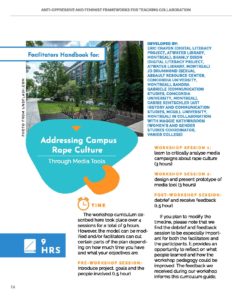 |
Facilitators Handbook for: Addressing Campus Rape Culture Through Media ToolsEric Craven (Digital Literacy Project, Atwater Library, Montreal), In Collaboration The workshop curriculum described here took place over 4 sessions for a total of 9 hours. If you wish to collaborate with the Atwater Library on this strategy please contact Eric Craven (eric at atwaterlibrary.ca) |
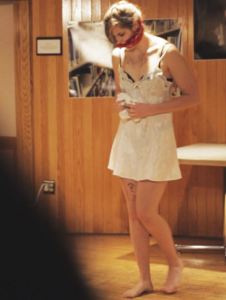
student artist: Claudia Benko |
Evaluation Framework Casestudy with Resist Violence
The following document has been developed to outline a process for collaborative, sustainable evaluation practices. The Atwater Library’s Addressing Rape Culture on Campus Strategy Evaluation project is collaborating with Dawson College’s Resist Violence Project to create an evaluation process that can be replicated and used to evaluate a range of strategies that address rape culture on campus. This document uses the Resist Violence Project as a case study to demonstrate how participatory evaluation can be beneficial in educational and community contexts. If you wish to collaborate with the Atwater Library and attend future meetings or have a topic idea you wish to request please contact Eric Craven (eric at atwaterlibrary.ca)
|
Atwater Forum Theatre ManualThis manual takes you through the steps that we follow when making a forum theatre piece as a strategy to address rape culture on college campuses. Document written by Anne-Marie St-Louis Forum Theatre Resources Appendix A |
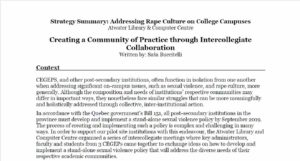 |
Creating a Community of Practice through Intercollegiate CollaborationWritten by: saša Buccitelli This guide explains how Atwater Library has been endeavoring to conduct our meeting with our partners and network through adapting a restorative circle approach. CEGEPS, and other post-secondary institutions, often function in isolation from one another when addressing significant on-campus issues, such as sexual violence, and rape culture, more generally. Although the composition and needs of institutions’ respective communities may differ in important ways, they nonetheless face similar struggles that can be more meaningfully and holistically addressed through collective, inter-institutional action. If you wish to collaborate with the Atwater Library and attend future meetings or have a topic idea you wish to request please contact Eric Craven (eric at atwaterlibrary.ca)
|
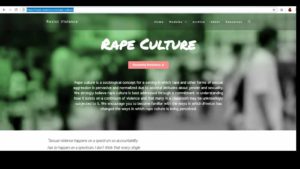 |
Resist Violence - A Pedagogy Rooted In Nonviolent Action (Dawson College Initiative)Pat Romano & Kim Simard - project leads teach and collaborate at Dawson College in Montreal, Canada Eric Craven and Shanly Dixon - Evaluation Framework of the pedagogy College students are at a critical juncture in their lives as they solidify their own values and ideas about the world. While student success improves when students deal with serious issues that are affecting them, many educators are reluctant to address violence for fear of leaving students overwhelmed or divided by controversial topics in the classroom. This pedagogy responds to these concerns by its solid grounding in insights from social psychology and nonviolence theory, and its inclusion into the classroom of nonviolent resistance and artistic activism, encouraging students to engage responsibly and meaningfully with the world around them. The goal of the Resist Violence project is to develop an effective pedagogy that seeks to engage students intellectually, emotionally and creatively on the problem of violence in their real and virtual lives. The project is both an interdisciplinary course-based violence prevention initiative and a web-based pedagogical resource that offers teachers innovative materials, along with the tools to creatively use photography, video and web-based media. Rape culture is a sociological concept for a setting in which rape and other forms of sexual aggression is pervasive and normalized due to societal attitudes about gender and sexuality. We strongly believe rape culture is best addressed through a commitment to understanding how it exists on a continuum of violence and that many in a classroom may be unknowingly subjected to it. We encourage you to become familiar with the ways in which #metoo has changed the ways in which rape culture is being perceived. This project would not be possible without the generous support of Dawson College’s Learning Communities, Entente Canada-Québec Funding and collaborations with the Atwater Library, Resist Violence alumni and many teachers and students. Thank you for all your continued support and advice. If you wish to collaborate with the Pat and Kim please contact resistingviolence at gmail.com or to discuss Evaluative Frameworks contact Atwater Library's Eric Craven (eric at atwaterlibrary.ca) |
